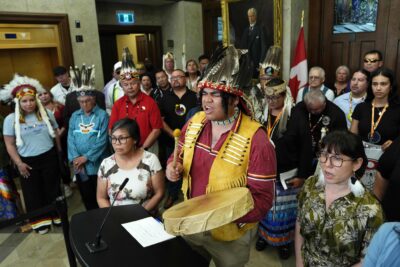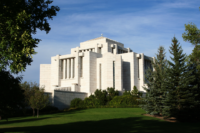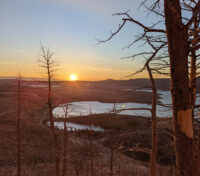First Nations youth say they’re ‘starting a movement’ against major projects bills
By Canadian Press on June 21, 2025.

OTTAWA — First Nations youth leaders are warning Canadians can expect a long, tense summer of protests as governments push forward with plans to fast-track major projects — and young people will be leading the charge.
“You will see us in your cities, your city’s hubs,” said Ramon Kataquapit, a youth councillor with the Chiefs of Ontario and Nishnawbe Aski Nation and a member of Attawapiskat First Nation in northern Ontario.
The federal Liberal government’s Bill C-5, which passed through the House of Commons Friday night, allows cabinet to quickly grant federal approvals for big industrial projects like mines, ports and pipelines. It sailed through a Commons committee in the early hours of Thursday with support from the Conservatives.
And in Ontario, Premier Doug Ford’s Conservatives have passed legislation allowing his government to designate “special economic zones” where the provincial cabinet can exempt companies or projects from having to comply with any provincial law, provincial regulation or municipal bylaw.
Both pieces of legislation have met with fierce resistance from First Nations leaders who accuse Ottawa and Queen’s Park of trampling on their rights and failing to consult with them in good faith.
Kataquapit said First Nations youth are “starting a movement” to protect their cultures and lands from what they see as increasing encroachment by governments looking to build major projects in a hurry.
He compared both pieces of legislation to a rock falling off a mountain.
“You don’t know how much momentum it’s going to build,” he said. “It might cause a mudslide and turn into something like an avalanche.
“This can turn into something much bigger, and a lot of our people — a lot of the youth — we see that.”
While chiefs have been the most prominent First Nations voices in news coverage of the legislation, Kataquapit said young people were the driving force behind recent rallies against the fast-track bills in northern Ontario, at Queen’s Park and on Parliament Hill.
He said they draw inspiration from the Anishinaabe Seven Fires Prophecy, which speaks of a “seventh fire” generation that will bring back traditional knowledge and ways of living after a period of cultural dislocation.
“We were raised to be the seventh generation,” Kataquapit said. “What I’ve been taught was that it’s my role to wake people up and to really show just how much colonization has affected us, but (also) how much strength we have in our traditional identity, culture …
“The seven fires are ready to take the steps that our leadership are falling back on because they fought a good fight for their entire lives. It’s just nature that you grow tired, scarred, traumatized.”
Terra Roy, another youth councillor with Chiefs of Ontario, said First Nations youth can do more than just protest — they can engage with the land and with traditional knowledge as an act of resistance.
“We have young people in Attawapiskat taking the rivers,” Roy said. “I’m happy that we’re returning to the land and continuing to occupy it.”
Roy, who works as a liaison between Beausoleil First Nation and the private sector, spoke to The Canadian Press while attending a project management training session in Edmonton.
Roy said the federal and provincial legislation makes their own work seem almost futile.
“I was like, ‘Well, what the heck did I just get hired for then if (governments are) just going to bulldoze over everything I say?’” Roy said.
“I’m here trying to create a whole department for my community so that we can have a greater say in our treaty area and then (governments) are like, ‘Oh, just kidding.’
“I’m angry. I’m frustrated, heartbroken, annoyed.”
Much of that frustration comes from a sense of déjà vu. First Nations say they’ve been in this position before, when legislation introduced by the Stephen Harper government to allow governments and businesses to push through projects without strict environmental assessment triggered the countrywide protest movement known as Idle No More.
Roy vividly remembers sitting with their mother as a child as they took part in an Idle No More protest at a mall.
“It’s frustrating that at 11 years old I was doing that, and now again at 23,” Roy said. “If I’m tired of having to fight this again, I can only imagine how my grandmother feels.”
Hanna Sewell, a nurse and a member of Batchewana First Nation near Sault Ste. Marie, Ont., said young people have to lead this fight because they’re the ones who will have to live with the impacts of accelerated development.
“If the land is sick, we’re going to be sick as well,” she said.
“We don’t want this bill, and we are the future generations that are going to govern this land and save it.”
Pierre Debassige, a member of M’Chigeeng First Nation and youth councillor for Anishinabek Nation, said First Nations won’t be the only ones to experience those impacts.
“If they start development in the Ring of Fire in the Far North, all those lakes, rivers all come down to the Great Lakes,” he said.
“If there’s that contamination that comes down from the North, it’s going to affect not only their communities, but here in southern Ontario.”
Debassige said it’s his generation’s turn to step up.
“United we stand and we conquer, but divided we fall one by one,” he said.
“I’m always thinking of that seven generations behind me (and) what my great-great-great-great grandchildren are going to be doing. Maybe they’ll see the work that I’ve done as a young person, (that I) fought for all of this.”
This report by The Canadian Press was first published June 21, 2025.
Alessia Passafiume, The Canadian Press
37-36





There is not much intelligence coming from the “ First Nations youth”! No surprise ,though. They are a welfare state. A welfare “first”nation. Do nothing, demand everything. The money has to flow from somewhere. We need to develop industry to supplement the non- productive ,self proclaimed nation. When is it going to stop? When the country is bankrupt?
Many were radicalized by the oil and gas protests who were funded by billionaires and foreign entities/countries for their own financial gains, protecting market shares and other investments and didn’t want those projects to go forward. There were many First Nations who had plenty of time on their hands and they were USED by them, knowing they were easily swayed. They are an easy mark!
They want more and more and more, but end all projects that would be pay for the more and more and more! They think money just gets printed and is endless! We have conditioned them to be like that by giving them all they want! We are in deep financial trouble in this country and if they refuse to allow projects to go forward that would benefit them, then it is time we started slashing their $30 billion annually budget the Canadian taxpayer doles out annually to support them. Provincial funds and municipal often are add to that total!
Reconciliation is one sided and will fail and the term reconciliation is incorrect, because true reconciliation are two sided, with both parties coming to an agreement to change a relationship by recognizing mistakes made, forgiving each other for those mistakes and forgetting them, moving forward in a respectful manner towards both parties.
The tail is wagging the dog now! They only make up 5% of Canadians!
The UN is partly to blame and it is part of the plan to destroy the West, divide and bankrupt it, so that their One World Government can manifest!
The First Nations are going to get a wakeup call when the One World Government rises and there will no longer be a free ride and they can look no further than in the mirror, because they played a big part in sucking the nation down!
There are valid reasons why the aforementioned movement, should take a deep breath and consider their actions.
My point at this moment however, is to call out the racist nonsense spewed (as usual) by OS and others.
Please elaborate on your assertion that First Nations youth should “consider their actions”.
Indeed, the “racist nonsense” arises from ill-informed, mis-informed perspectives concerning First Nations in particular and Indigenous peoples in general. All this despite the plethora of books and the availability of free courses centered on the history of Indigenous/non_Indigenous relationships.
Recommended reading and study:
Indigenous Rights in One Minute, by Bruce McIvor
https://harbourpublishing.com/products/9780889714885?srsltid=AfmBOoqxiZv_UqmMYWiJh4qT6sbP-Mht_zC8Ej4A-QlgXbhEoPE-6Ubz
The Reconciliation Manifest, by Arthur Manuel and Ronald Derrickson
https://libguides.okanagan.bc.ca/AntiRacismBookClub/ReconciliationManifesto
Indigenous Canada is a free online 12 lesson course designed for those with an interest in acquiring a basic familiarity with Indigenous/non-Indigenous relationships.
https://www.ualberta.ca/en/admissions-programs/online-courses/indigenous-canada/index.html